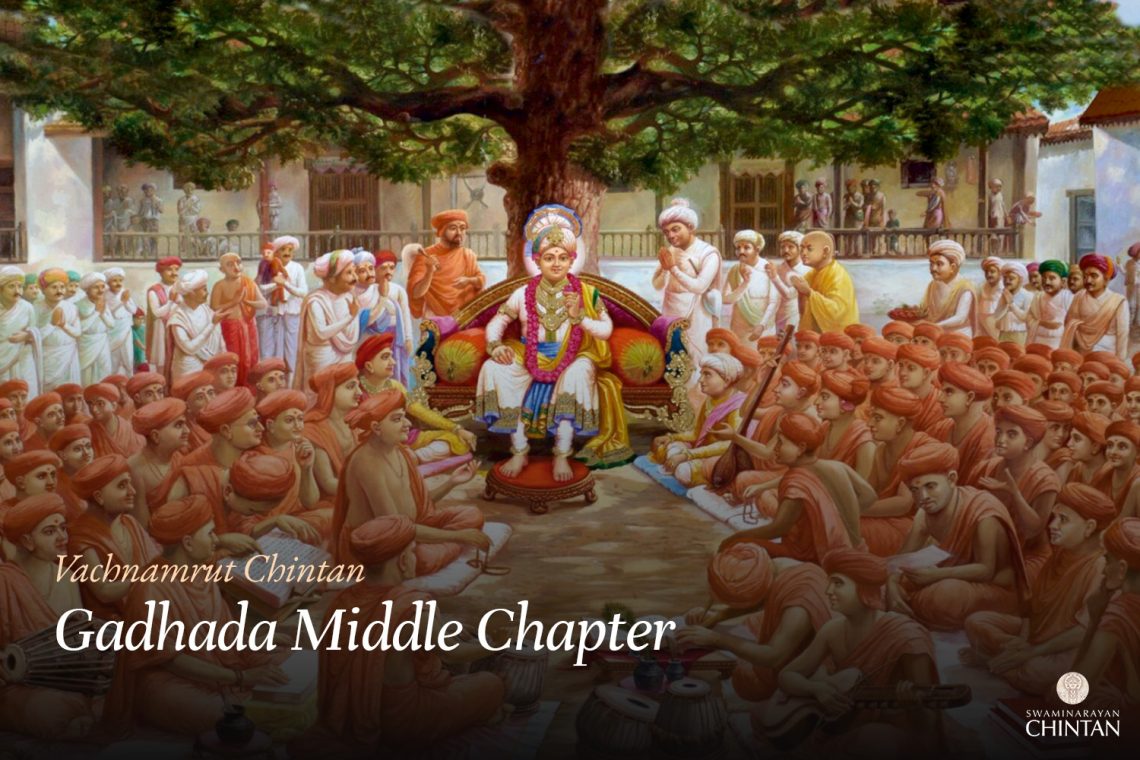Central Insights:
- Offering an additional prostration (Dandvat Pranam).
Key Points:
- There is no sin greater than offending a bhakta (devotee) of Bhagwan. The suffering caused to the soul by this offense surpasses that of any other sin.
- No other practice or method can purify the soul as effectively as serving a bhakta of Bhagwan.
- To seek forgiveness for offenses, one should offer an additional dandvat as a part of one’s daily routine.
Explanation:
In this Vachanamrut, Maharaj was residing at His residence in Gadhada. In the morning, after completing His daily rituals and worship, He offered a full prostration (dandvat pranam) to the idol of Shri Krishna Bhagwan. On this particular day, He offered one additional dandvat pranam beyond the usual number. Observing this, Shukmuni asked, “Maharaj, why did you offer one extra pranam today?” The saints would observe Maharaj’s actions with great detail. Maharaj replied, “Every day, I bow to Shri Krishna Bhagwan and pray, ‘O Bhagwan! Please remove any sense of aham (ego- ‘I’ ness) or mamattva (attachment to the body and its associations – ‘My’ ness).’”
Last night, I was listening to the Vishnupurana, particularly the story of Durvasa and Indra before I went to sleep. Due to Durvasa’s insult, Indra fell from grace and faced total destruction. Indra had to wander aimlessly, and as a result, all the devas (deities) and the three worlds suffered. After reflecting on this, I thought that the suffering caused to the soul by offending a bhakta of Bhagwan, whether knowingly or unknowingly, is far greater than the suffering caused by any other sin. Therefore, to atone for any offense, whether through thought, speech, or action, I offered one extra pranam today.
Maharaj said, “I firmly believe that no sin brings as much suffering to the soul as offending a bhakta of Bhagwan.” The fall of Ravana, the Kauravas, and others described in the line, “Sants suffer, and with them fall the kingdom, lineage, and power, none escaped this,” was not due to violence or sins like brahmahatya (killing of a Brahmin), but solely due to offenses against bhaktas. Even King Mandalik, a righteous ruler, had to face hardships after offending Narasinh Mehta. In the history of our sampradaya, too, those who have offended great santos did not die peacefully.
Maharaj emphasized that the suffering caused by such offenses is greater than that caused by any other sin. In one instance, a person who had offended a sant was suffering greatly, so they took blades of grass between their teeth and pleaded with Swami, either to relieve them from their suffering or to take away their life. Swami responded by saying that they should seek forgiveness from the person they had offended. Pujya Shastriji Maharaj often shared examples of those who had offended Narayan Swami and other great saints, and the suffering they endured. It is also fitting to recall the examples of those who offended Pujya Shastriji Maharaj and faced similar consequences.
Maharaj continued, “The benefits gained by serving a bhakta of Bhagwan—whether through mind, speech, or body—cannot be attained through any other means, not even through punya (merit) or tapasya (austerities). Additionally, offenses against bhaktas are driven by greed, pride, envy, and anger. Honor towards a bhakta arises only when these four traits are absent.”
The unique challenge on the spiritual path is that we often see the faults we possess in others. This is not a major issue as long as we only see them in others, but the problem arises when we see these faults in pure individuals and are then prompted to commit offenses against them. The greedy person finds sadhus (ascetics), the poor, and the needy to be burdensome. The envious person feels intense pain when they see the honor and livelihood of sadhus. Anger clouds judgment, and pride leads tyagis (renunciates) to expect excessive respect. When these expectations are not met, they turn into offenses. Thus, Maharaj says that only when these four vices are absent can one truly honor a bhakta of Bhagwan.
Therefore, Maharaj advises, if one wishes to experience supreme happiness in this body, and even after leaving the body, one should never offend a bhakta of Bhagwan in thought, speech, or action. This instruction is not merely to ensure happiness after death, but to achieve supreme peace while living in this body as well. If one has ever, knowingly or unknowingly, offended a bhakta, they should seek forgiveness through their words and offer prostrations with their mind and body. Be mindful not to repeat such offenses, as seeking forgiveness and then repeating the same mistakes will only double the offense.
Maharaj concludes by advising that, from today onwards, His bhaktas should adopt the practice of offering one additional dandvat during their daily worship and pray to Bhagwan to prevent any future offenses against His bhaktas, and to seek forgiveness for any past offenses, whether known or unknown.
Glossary
| Dandvat Pranam – Prostration or bowing down A physical gesture of humility and surrender, acknowledging one’s servitude to Bhagwan and His devotees. |
| Aham – Ego or sense of “I” |
| Mamattva – Attachment or sense of “Mine” |
| Bhakta – Devotee |
| Aparadh (Offense) – Transgression or disrespect Specifically refers to offenses against Bhagwan’s devotees in thought, word, or deed. |
| Vishnupurana – A scripture focused on the glory of Vishnu and His devotees |
| Punya – Good Deeds |
| Tapasya – Austerity or penance |

